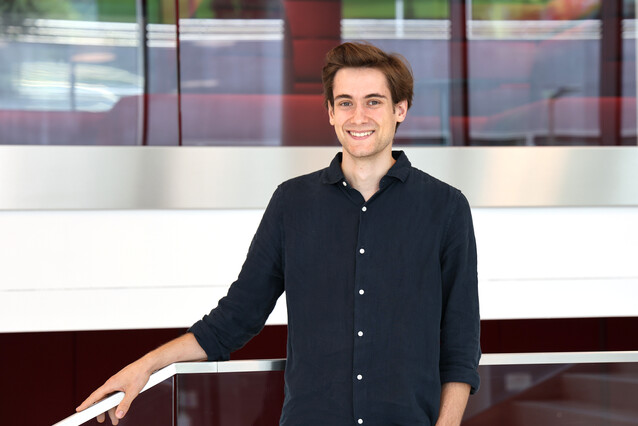IMP PhD student Moritz Helmut Wallnöfer awarded BIF Fellowship
Moritz Helmut Wallnöfer, PhD student in Tim Clausen’s lab at the IMP, has been awarded a prestigious fellowship from the Boehringer Ingelheim Fonds (BIF). His research explores how human cells recognise and eliminate pathogens—work that could reshape our understanding of immune defence at the molecular level.
The Boehringer Ingelheim Fonds (BIF) has awarded a prestigious fellowship to Moritz Wallnöfer, a PhD student in the lab of Tim Clausen at the IMP. The fellowship will support his research on how human cells detect and fight off intracellular pathogens.
Certain pathogens, including Salmonella enterica, Listeria monocytogenes, and the parasite Toxoplasma gondii, can invade human cells and replicate intracellularly. To detect and eliminate these invaders, immune cells rely on specialised proteins. One such protein is RNF213, a large E3 ubiquitin ligase that directly senses and is activated by certain pathogen-associated molecular signatures. Active RNF213 then helps defend cells by tagging invading pathogens with ubiquitin—a molecular signal that directs them to the cell’s cleanup system, autophagy. Surprisingly, recent research has revealed that RNF213 doesn’t just tag proteins, but also other components of the bacterial outer membrane. This discovery challenged longstanding assumptions in the ubiquitin field by showing that non-protein substrates can be ubiquitinated.
In his PhD project, Wallnöfer aims to understand how RNF213 is switched on during infection and how its different functional modules work together to recognise invading pathogens and trigger their removal. By combining structural, biochemical, and cell biology approaches, his work will shed light on the molecular mechanisms of this unique immune sensor.
Moritz Wallnöfer studied molecular medicine at the Medical University of Innsbruck, and earned his master's degree in molecular biosciences from the University of Heidelberg. For his master’s thesis, he joined the MRC Laboratory of Molecular Biology in Cambridge, where he studied the integrated stress response (ISR), another key cell defence pathway. He joined the IMP in October 2024 through the Vienna BioCenter PhD Program.
About the BIF PhD Fellowships
The Boehringer Ingelheim Fonds (BIF) awards PhD fellowships of 2 to 3.5 years to outstanding junior scientists worldwide who wish to pursue an ambitious PhD project in basic biomedical research in an internationally leading laboratory.
The peer-review selection process evaluates the applicant's achievements, as well as the scientific quality of the project and host laboratory. The process is highly competitive, with less than 10 percent of applicants receiving a fellowship.
On top of the monthly stipend, the BIF offers fellows seminars, travel allowances, individual and personal support, and access to a worldwide network of fellows and alumni.
Further Reading
